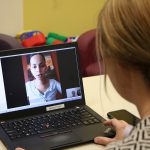Thirty years after President George H. W. Bush signed the Americans with Disabilities Act into law, State Council for Persons with Disabilities Director John McNeal celebrated the progress made in civil rights for people with disabilities. However, McNeal said that more work is needed, especially in areas such as mental health care and home- and community-based services.
Gov. Carney recently signed into law a bill temporarily expanding the scope of telemedicine services. Under the law, which expires July 1, 2021, physicians may perform services remotely they previously needed to do in-person, such as prescribe opioids, and patients do not need to have an in-person intake meeting before starting remote sessions.
Two UD epidemiologists write in the American Journal of Preventive Medicine that data from the early stages of the coronavirus pandemic indicate people with disabilities, members of racial and ethnic minorities, individuals with limited English proficiency and those with housing or transportation needs were at higher risk of contracting the virus in various regions of the U.S. They say this information can help dictate the best locations for additional Covid-19 testing sites.
The federal Government Accountability Office (GAO) estimates that more than 60 percent of public schools in the U.S. have physical features, such as steep ramps and narrow double doors, that make navigating the building or grounds difficult or unsafe for individuals with disabilities. The GAO also found that approximately one-in-five school districts have at least one building so inaccessible that it is not attended by students with physical disabilities.
Delaware Treasurer Colleen Davis joined other state treasurers in urging Congress to raise the maximum age for starting an ABLE account from 26 to 46. This would make an estimated 6 million more people eligible to open an account. ABLE accounts are savings accounts with certain tax advantages for people with disabilities.





